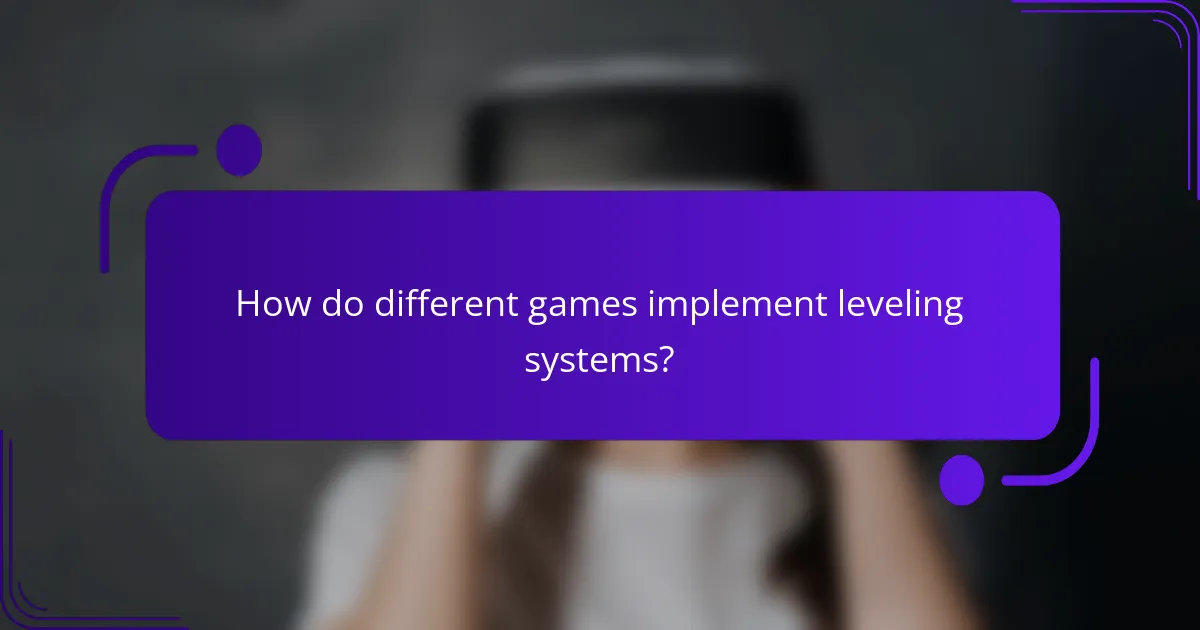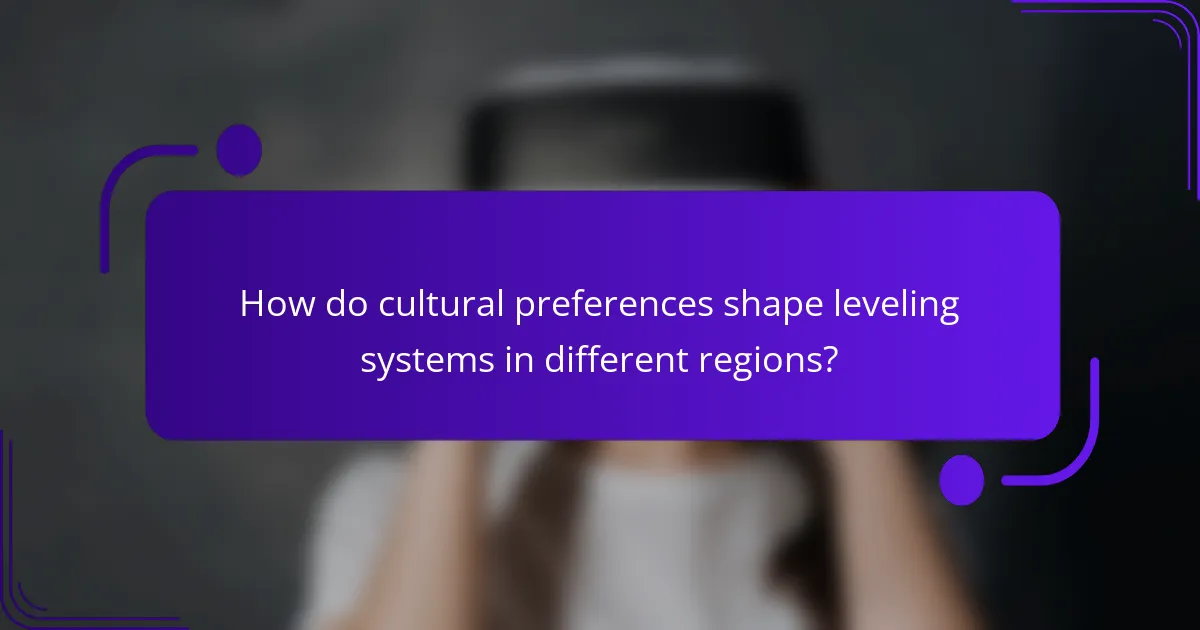Leveling systems in multiplayer fantasy adventure games enhance player engagement and progression. This article explores experience points, skill progression, and character customization. It also examines different design methods and cultural influences. Finally, we will discuss innovations shaping the future of leveling systems in 2025.

What are the key components of leveling systems in multiplayer fantasy adventure games?
Leveling systems in multiplayer fantasy adventure games typically include experience points, skill progression, and character customization. These components enhance player engagement and progression.
Experience points (XP) are earned through completing quests, defeating enemies, and exploring. Players accumulate XP to reach new levels, unlocking abilities and rewards.
Skill progression allows players to develop specific talents, enhancing gameplay styles. This can include combat skills, crafting abilities, or magic proficiency, enabling diverse character builds.
Character customization offers players the chance to personalize their avatars with unique traits, appearances, and gear. This fosters a sense of ownership and investment in the game.
How does character progression impact gameplay experience?
Character progression significantly enhances gameplay experience by providing a sense of achievement and personal growth. Players feel more engaged as they unlock new abilities and improve their characters over time. This progression often influences gameplay mechanics, such as combat effectiveness and exploration capabilities.
Additionally, leveling systems encourage players to invest time in the game, leading to deeper immersion in the game world. As players progress, they often encounter unique challenges tailored to their character’s level, enhancing the overall enjoyment and satisfaction of overcoming obstacles.
The social aspect of character progression also plays a vital role. Players often share their achievements and compare their characters with others, fostering a sense of community. This interaction can lead to collaborative gameplay experiences, such as team-based quests or challenges that require coordinated efforts.
Ultimately, character progression in multiplayer fantasy adventure games shapes player motivation, satisfaction, and social engagement, making it a core component of the gaming experience.
What roles do experience points play in leveling systems?
Experience points are crucial in leveling systems as they determine player progress and skill enhancement. Players earn experience points through various activities, such as defeating enemies, completing quests, or exploring environments. Accumulating these points leads to level increases, unlocking new abilities and enhancing attributes. This progression system creates a sense of achievement and motivates continued gameplay. Additionally, experience points can vary based on the difficulty of tasks completed, adding a unique attribute to the leveling experience.
Which factors influence the rate of leveling up?
The rate of leveling up in multiplayer fantasy adventure games is influenced by various factors. Key elements include experience points gained from completing quests, defeating enemies, and exploring new territories. Additionally, the difficulty of challenges faced and player skill level significantly impact progression speed. Game mechanics, such as experience multipliers or bonuses for consecutive victories, also play a crucial role. Lastly, the efficiency of resource management, including time spent on grinding versus completing objectives, can affect leveling pace.

How do different games implement leveling systems?
Different games implement leveling systems through various methods that enhance player engagement and progression. Common approaches include experience points, skill trees, and tiered rewards.
Experience points (XP) are earned through completing quests, defeating enemies, or achieving objectives. This method provides a clear metric for player growth and encourages exploration. Skill trees allow players to choose specific abilities or enhancements, tailoring their character’s development to their playstyle. This unique attribute fosters personalization and strategy.
Tiered rewards offer players incentives at specific milestones, creating a sense of achievement. Games may incorporate rare items or abilities unlocked at higher levels, adding excitement to the leveling experience. These systems can vary significantly between titles, impacting player motivation and game longevity.
What are examples of leveling systems in popular titles?
Leveling systems in popular multiplayer fantasy adventure games include experience points, skill trees, and class advancements. These systems enhance gameplay by providing progression and customization options.
For example, in “World of Warcraft,” players gain experience through quests and combat, unlocking new abilities and talents as they level up. “The Elder Scrolls Online” features a flexible skill tree that allows players to choose abilities across various classes, promoting diverse playstyles. “Final Fantasy XIV” employs a job system where players can switch classes and level them independently, offering unique gameplay experiences.
These leveling systems contribute to player engagement and retention by creating a sense of achievement and character development.
How do leveling systems vary between action RPGs and turn-based RPGs?
Leveling systems in action RPGs focus on real-time character progression, while turn-based RPGs emphasize strategic growth during combat. Action RPGs often feature continuous leveling through experience gained in battles, allowing players to adapt quickly. In contrast, turn-based RPGs typically use a more structured approach, where leveling occurs at specific intervals, often after completing quests or defeating enemies. This difference in pacing and mechanics influences gameplay style and player engagement. Additionally, action RPGs may offer unique attributes like skill trees for immediate combat enhancements, while turn-based RPGs often prioritize rare attributes like tactical planning and resource management.

What are the advantages of various leveling system designs?
Various leveling system designs in multiplayer fantasy adventure games offer distinct advantages. These systems enhance player engagement, provide a sense of progression, and cater to different play styles.
Experience-based leveling systems reward players for completing quests and defeating enemies, fostering a sense of achievement. Skill-based systems allow players to focus on specific abilities, promoting customization and strategic gameplay. Class-based systems create unique roles, encouraging teamwork and collaboration among players.
Additionally, hybrid systems combine elements of experience and skill-based leveling, offering flexibility and depth. This diversity in leveling designs enriches the gaming experience, making it more enjoyable and immersive for players.
How does a linear leveling system compare to a non-linear one?
A linear leveling system provides consistent progression, while a non-linear one offers varied paths and choices. Linear systems typically have fixed experience points and levels, promoting straightforward advancement. Non-linear systems allow players to explore different skills or areas, enhancing replayability. Players may prefer linear systems for their predictability, whereas non-linear systems cater to those seeking exploration and customization. Each system impacts gameplay dynamics and player engagement differently.
What benefits do dynamic leveling systems offer to players?
Dynamic leveling systems enhance player engagement by providing personalized challenges, rewarding progression, and ensuring balanced gameplay. These systems adapt to individual player skills, creating a tailored experience that maintains interest and motivation. Players encounter a variety of challenges that evolve based on their performance, fostering a sense of achievement. As a result, dynamic leveling systems contribute to a more immersive and satisfying gaming experience.

What challenges do developers face when designing leveling systems?
Developers face several challenges when designing leveling systems in multiplayer fantasy adventure games. Balancing progression is crucial; players must feel rewarded without becoming overpowered. Ensuring that leveling feels meaningful often requires unique attributes for each level, which can complicate design. Additionally, maintaining player engagement through diverse mechanics and avoiding grind is essential. Finally, integrating community feedback can help refine systems but may lead to conflicting player expectations.
How can balancing issues affect player satisfaction?
Balancing issues can significantly diminish player satisfaction in multiplayer fantasy adventure games. When players perceive that certain characters or abilities are overpowered, it creates frustration and discourages engagement. This imbalance can lead to a lack of competition, as players may feel that their efforts are futile against stronger opponents.
Additionally, poor balancing can disrupt the game’s progression system, making it difficult for players to enjoy leveling up or achieving milestones. If a game’s mechanics favor specific playstyles, players may feel compelled to conform, limiting their freedom of choice.
As a result, developers must prioritize balance to enhance player experience and retention. Continuous feedback and adjustments based on player input can help maintain a fair environment, ensuring that all players feel valued and engaged.
What are common pitfalls in leveling system design?
Common pitfalls in leveling system design include imbalance, lack of engagement, poor pacing, and unclear progression. These issues can lead to player frustration and decreased enjoyment.
Imbalance occurs when certain levels are too easy or too difficult, disrupting the challenge curve. Lack of engagement results from repetitive tasks that do not provide meaningful rewards, causing players to lose interest. Poor pacing affects the flow of gameplay, making it feel either rushed or sluggish. Unclear progression can confuse players about how to advance, leading to disengagement.
Addressing these pitfalls involves regular testing, player feedback, and iterative design to ensure a balanced and rewarding experience.

How do cultural preferences shape leveling systems in different regions?
Cultural preferences significantly influence leveling systems in multiplayer fantasy adventure games by shaping player expectations and engagement. Different regions may prioritize aspects such as narrative depth, character development, or competitive elements, which directly affect how leveling is structured.
For instance, in East Asian markets, leveling systems often emphasize collaborative gameplay and community engagement, leading to systems that reward teamwork and social interaction. Conversely, Western regions may favor individual achievement, resulting in leveling systems that highlight personal milestones and competition.
Additionally, cultural storytelling traditions can impact the thematic elements of leveling systems. Games in cultures with rich mythological backgrounds may incorporate lore-driven progression, while others might focus on skill-based advancements.
Understanding these cultural nuances allows game developers to create more appealing and regionally relevant experiences, enhancing player satisfaction and retention.
What unique attributes of leveling systems appeal to players in various markets?
Unique attributes of leveling systems in multiplayer fantasy adventure games include progression speed, customization options, and social interactions. Players are drawn to systems that allow for personalized character development and unique skill trees. Additionally, the sense of achievement from leveling up fosters engagement and competition among players. These elements vary across markets, influencing player preferences and retention.
How do regional gaming trends influence leveling mechanics?
Regional gaming trends significantly influence leveling mechanics by shaping player expectations and engagement strategies. Different regions may prioritize distinct gameplay styles, affecting how leveling systems are designed. For instance, Asian markets often favor faster leveling to retain players, while Western markets might emphasize narrative depth and gradual progression. This divergence leads to unique attributes in leveling systems, such as experience gain rates and reward structures tailored to cultural preferences. As a result, developers must adapt their mechanics to align with regional trends, ensuring that players feel a sense of achievement and satisfaction in their gaming experience.

What innovations are emerging in leveling systems for 2025?
Innovations in leveling systems for 2025 include adaptive progression mechanics, AI-driven difficulty adjustments, and enhanced player choice. These advancements aim to create a more personalized gaming experience. Adaptive systems allow players to level up based on their play style, while AI algorithms analyze player performance to adjust challenges dynamically. Enhanced choice empowers players to shape their character development and gameplay strategies, fostering deeper engagement. Overall, these innovations prioritize player satisfaction and immersion in multiplayer fantasy adventure games.
How is technology changing the way leveling systems are structured?
Technology is reshaping leveling systems in multiplayer fantasy adventure games by introducing dynamic progression and personalized experiences. Advanced algorithms analyze player behavior, allowing for adaptive difficulty and tailored rewards. This enhances engagement and satisfaction. Additionally, cloud gaming and cross-platform play enable seamless leveling across devices, fostering community and competition. Gamification elements, such as achievements and leaderboards, further motivate players to explore and progress. These innovations create a more immersive and rewarding gaming environment.
What role do player feedback and data analytics play in evolving leveling systems?
Player feedback and data analytics are crucial for enhancing leveling systems in multiplayer fantasy adventure games. They provide insights into player experiences and preferences, allowing developers to adjust difficulty, pacing, and rewards. This iterative process helps maintain player engagement and satisfaction.
Player feedback often highlights aspects of the leveling experience that may need improvement, such as grindiness or lack of clarity. Data analytics track player progression and behavior, revealing patterns that inform game balance. For example, if data shows players are consistently stuck at a certain level, adjustments can be made to ease that transition.
The combination of qualitative feedback and quantitative data creates a comprehensive understanding of player needs. This approach allows for tailored experiences, ensuring that leveling systems evolve to meet the expectations of diverse player bases. As a result, games can achieve better retention and enjoyment.
What best practices should developers follow when creating leveling systems?
Developers should prioritize player engagement, balance, and progression when creating leveling systems. Effective systems provide clear rewards, maintain challenge, and encourage exploration.
1. Define clear goals for each level to guide player progression.
2. Ensure a balanced difficulty curve to keep players motivated.
3. Incorporate meaningful rewards that enhance gameplay experience.
4. Allow for player choice in character development to foster personalization.
5. Test and iterate based on player feedback to improve the system continuously.